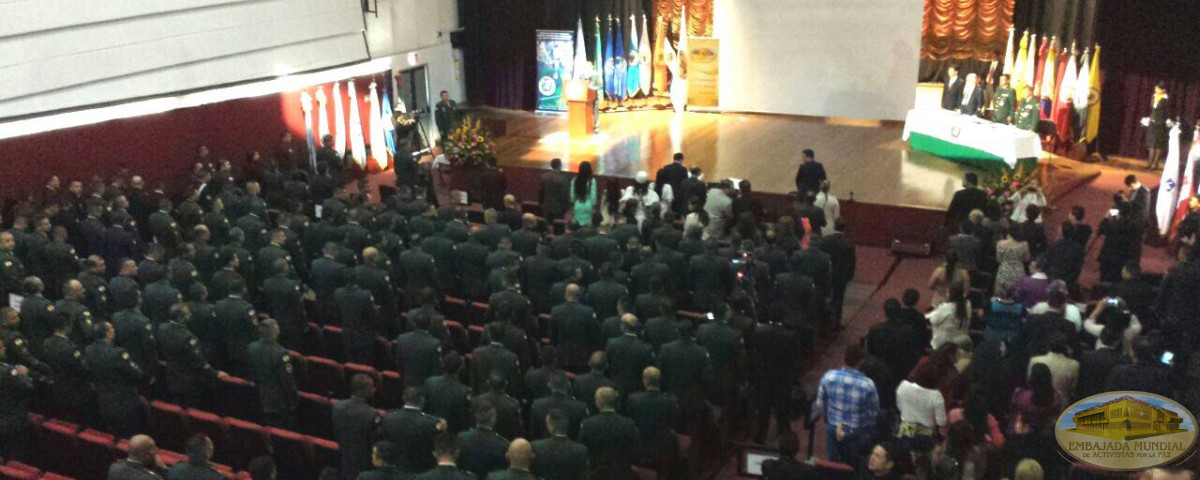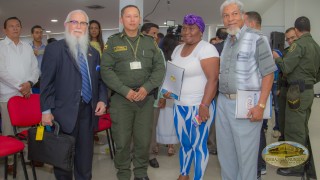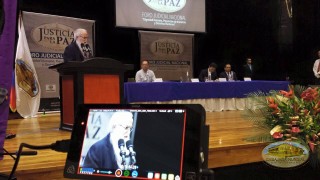The Armed Forces of Colombia receive Education for Peace
III National Judicial Forum of the GEAP
More than 1,100 Colombian Army soldiers attended the 3rd National Judicial Forum at the headquarters of the Centro de Educación Militar in Bogotá, sponsored by the Global Embassy of Activists for Peace (GEAP) in the framework of “Justice for Peace.”
They were one by one biometrically registered to welcome Human Rights specialists from Puerto Rico, Argentina, Colombia, United States, Cuba, Mexico and Paraguay, who spoke on the principles of Human Dignity, presumption of innocence and Human Rights (HR).
«Freedom, justice and peace in the world are based on the recognition of inherent dignity and equal and inalienable rights of all the members of the human family.»
With this preamble of the Universal Declaration on Human Rights, Dr. William Soto Santiago, CEO of the GEAP, and General Nicasio de Jesús Martínez Espinel, Head of Education and Doctrine of the National Army, representing the Escuela de Derechos Humanos y Derecho Internacional Humanitario of Colombia (School of Human Rights and International Humanitarian Law of Colombia), initiated the forum.
Formula to build peace
«Justice is administered with the truth, and with dialogue reconciliation is reached. That is how the peace the Colombian nation yearns is built.»
With these words, Dr. Soto reiterated that it is necessary to guarantee the right to truth, justice and reparation of victims.
«They must exhaust all necessary efforts to identify the points of agreement. The points of convergence and respect for the other, even if they think differently, are the foundation of any process of peace», he urged.
History has witnessed the humans struggle for the protection of their rights in diverse cultures such as Rome, Greece, India, France and United States; but it was in 1948 when he managed to consolidate under a single document the rules that currently govern the 192 countries that make up the United Nations (UN).
The necessity to know the Human Rights in all social spheres
The Director of Legal and Political Sciences, Judge in the forensic area before the Oral Court of Argentina, Dr. Franco Marcelo Fiumara, attended the table of honor and spoke on “Human Rights during the dictatorship,” noting the similarity between dictatorships throughout history.
«Nothing can escape the scope of Law and Education, and the United Nations understands it this way; and I believe that every day it becomes more necessary to learn all this scaffolding, to be able to educate in international symmetrical parameters the youth to come, the youth that in the future will occupy positions of public importance», he argued.
The Seventh Procurator before the Tribunal of Bogotá and Cundinamarca, Specialist in Penal and Criminological Sciences, Dr. Camilo Montoya Reyes, stressed that the presumption of innocence was born as an antagonist response to the presumption of guilt, which is linked to the principle of human dignity and respect for freedom.
«The presumption of innocence limits the grounds for deprivation of liberty of a human being, limits the duration of the privacy of a human being and the intensity of the deprivation of freedom», he said.

The Ministry of Defense was present with the remarks of the Director of Rights of the Armed Forces, Lt. Carlos Soler Parra, who explained the different conventions that compose the International Humanitarian Law, explaining that it is a special law that applies as a minimum rights in wartime in order to protect victims in the midst of conflict.
The Superior Judicial Council intervened with the presentation of Magistrate Pedro Alfonso Sanabria, with the topic “Human dignity in the constitutional context.” Sanabria also answered the questions of the military on the expansion of military jurisdiction in Colombia, and he emphasized that there is a difference between a civilian and a soldier carrying out their work, which should be considered.
Ati Quigua, Indigenous leader and delegate of the Advisory Commission of Peace of the Presidency of the Republic of Colombia, revealed the novelty of the concept of Human Rights before native peoples, stating that it did not exist in their world until the anthropocentric concept introduced it.
The student representatives, Juan Manuel Moreno Sanabria and Camilo Montoya Real of the Universidad de Harvard y de los Andes in Colombia (Harvard University and of the Andes in Colombia), respectively, also participated with the topic “Freedom of expression and dialogue in a process of peace,” under the premise of Voltaire who said: “I disapprove of what you say, but I will defend to the death your right to say it.”

Human Rights a shared responsibility
To conclude the Forum, the soldiers recited the “Oración a la Patria” (Prayer to the Motherland) as a yearning of freedom and respect, accompanied by their marching band, before senior military officers and various prosecutors, who agreed that Human Rights are not a history lesson, they are not a speech; they are the responsibility we all share with our neighbor.


